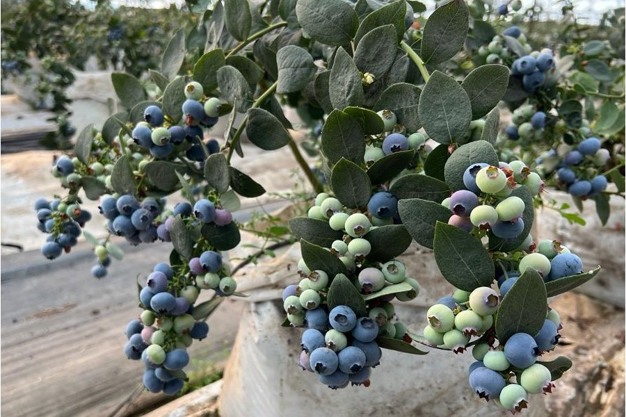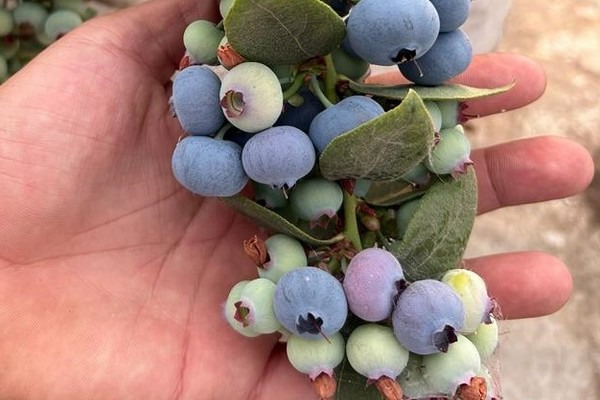Climate change, manifested in Peru in the form of higher temperatures driven by the El Niño Phenomenon, has posed significant challenges for the country's blueberry industry. This circumstance, coupled with other factors, such as water quality or excessive radiation, make genetic innovation a key alternative to face this new and challenging scenario.
This was recently stated by the president of the Association of Blueberry Producers of Peru (Proarándanos), Daniel Bustamante Canny, who highlighted that "new blueberry varieties, especially those that require zero chilling hours, have shown remarkable resilience to high temperatures," in a campaign in which a very significant drop in the production volume is being recorded.

"It seems confirmed that these varieties are setting the trend to mitigate future climate-related problems, which strengthens the idea that genetics is a key element to ensure the sector's development and sustainability," says Carlos Castillo, international consultant and blueberry expert.
"It is essential that producers carefully select the varieties they plant, as climate change has become yet another crucial factor in agriculture. Selecting varieties that meet multiple requirements, such as productive yields, fruit quality and resistance, is essential to be able to compete efficiently in the global market," he says.
Castillo argues that "given that production conditions are constantly changing, mainly due to climatic factors, as well as the rising levels of CO2 in the atmosphere (a consequence of pollution), the conditions for blueberry production are becoming very adverse. Therefore, the development of new varieties with adapted genetic characteristics is becoming indispensable to meet the production levels demanded by the international markets, both in terms of quantity and quality."
Blue Madeira and Blue Manila, from Planasa
Planasa's tropical blueberry genetics have been presented as the key not only to overcome droughts, radiation and stress, but also to guarantee long-term sustainability. The company has put the spotlight on the Blue Madeira and Blue Manila varieties.
According to Planasa, "the Blue Madeira is a highly productive and vigorous variety, with a surprising capacity to respond to abrupt temperature changes. Its exquisite taste and abundance of fruits at pruning time make it an ideal choice for producers."
As for the Blue Manila, "we are dealing with a super jumbo variety, recognized for its excellent taste and precocity. It allows harvesting between April and June, facilitating an early pruning and making it possible to have up to 1.5 campaigns per year. Both varieties are not only making the most of adversity to stand out, but also offering high fertility, differentiation and an irresistibly attractive taste for the consumer."
"Both are evergreen and stand out for being no-chill varieties (requiring zero chilling hours), which allows them to adapt to tropical climates and gives them a unique capacity to withstand and even thrive in unfavorable climatic conditions. They maintain their high fertility and offer a very attractive taste for the consumer. Also, both varieties reach the end of the campaign with very good material, in terms of structure, for the next campaign," says Planasa.

This has all been confirmed by international consultant Dr. Carlos Castillo. "These varieties have shown a very interesting behavior over the last two years, in which the rising temperatures and ultraviolet light index have caused great stress to older varieties like the Ventura and Biloxi, which have not delivered a good production."
"However, new varieties like the Blue Madeira and Blue Manila have managed to maintain their high productive levels and exceptional quality in Peru and Mexico, achieving average productions of 3.6 Kilos per plant, both in the current productive cycle and in the second -with densities of 9,000 plants per hectare. Moreover, they have delivered average calibers of 21 millimeters, a brix of 14º and an extraordinary bloom, so it is clear that the vigor and resistance of the new varieties to extreme climate changes is one of their most outstanding characteristics," says the expert.
Planasa, which is celebrating its 50th anniversary this year, will be present again at Fruit Logistica Berlin, from February 7 to 9, 2024. This time, you can find them on stand B-71, located in hall 8.2.
 For more information:
For more information:
Palanasa
[email protected]
www.planasa.com/pe/
